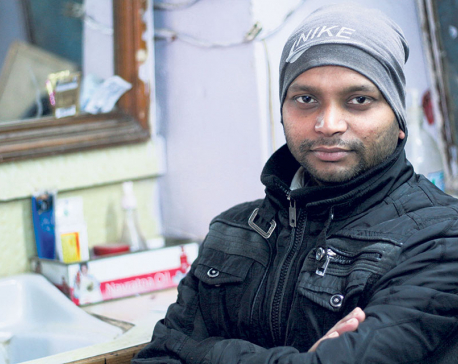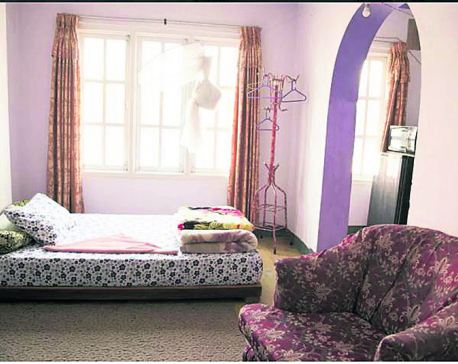
OR
My voice
More from Author
As far back as I can remember, whenever my semester report card came out, I would always proudly show it to my dad. He would smile lightly, congratulate me on a job well done and then warn me that I would need to study even more next semester to keep progressing. While he was certainly correct, I definitely felt that I coasted through most of high school.
Despite my parents and teachers telling me not to leave studying to the last minute, it was a strategy that kept working wonders for me. At the same time, I knew very well that such an approach would never work in the long run. Cue Cornell University, which I have called home since August 2016. My time so far at this Ivy League university has been one of my happiest, most remarkable and undoubtedly the most intellectually stimulating.
When the word “college” pops up in any conversation, one is naturally inclined to think of wild parties and the freedom of being away from home. After all, there’s a reason people usually cite their college years as the best of their life. While the aforementioned aspects are certainly part of the ultimate college experience, the side that pop culture often ignores is the amount of studying needed to get by.
For instance, there have been days where I have spent hour after hour frantically trying to finish a project - all in the knowledge that once I was done I would immediately have to work on another assignment. Barring perhaps my senior year, I havehad to study far more every day in my very first year of university than I ever had to in high school.
I knew very well the level of competition I would face once I was at Cornell. After all, the university itself is the result of putting thousands of brilliant minds in the same environment. However, the intelligence of my peers continues to surprise me every day. When I got my very first college assignment back, I was delighted at the red circle with the number 92 that stared back at me.
Excitedly, I asked some of my classmates what they got, certain that I had done better. Instead, I heard “ninety-five”, “ninety-eight”, “one hundred.” At that moment I realized just how different Cornell was from high school. Although my high school graduating class was very strong academically, thiswas clearly on another dimension. No matter what you achieve there is always someone doing better.
I know people who are board members of multiple clubs, work multiple jobs, maintain a great social life and simultaneously get terrific grades. I have to admit that such competition does at times hurt a student’s ego and self-worth – to be considered a genius back in high school and then suddenly having that entire reputation fed to the gutter.
Fortunately, I usually feel the opposite effect in that watching my peers succeed motivates me and fills me with an intense desire to similarly thrive. Waking up on Sunday mornings to find people already hitting the books, preparing to spend the entire day studying, spurs you on in a way I never would have felt elsewhere.
Unsurprisingly for a university that is the alma mater of famous names such as Bill Nye “the science guy”, iPod developerJon Rubinstein, and Tata Group CEO Ratan Tata, Cornell provides its students with incredible networking opportunities. There are not too many universities where you have companies like Goldman Sachs looking for potential new hires and former presidential candidates giving guest lectures, both of which I have already witnessed in my first semester here.
I also experienced Cornell’s astoundingly successful alumni network first-hand when talking to former Cornell graduates during a networking trip in New York City. Moreover, the university itself helps students improve their resumes, holds mock interviews and provides a plethora of other career resources. With such a level of support from the university it is no wonder that upon graduation Cornell’s students end up amongst the world’s elite.
One con, however, is that the students can sometimes appear to be simply walking and talking resumes. The same drive that enables the students to be so successful may also make them so goal oriented that they forget the other aspects of life. The challenge therefore, is to find individuals who are diligent and responsible yet who also truly enjoy the company of others.
Fortunately, Cornell has surprised me in this regard. Before joining, I thought that many students would be the embodiment of the word“nerd,”being attracted like magnets to their books and possessing poor social skills.On the contrary however, the vast majority of people that I’ve met on campus so far have been extremely pleasant individuals who are adept at juggling their social and academic lives. It is a result of this that in just a few short months I have already made some great friends and found (yet another) place to call home.
Another criticism of Cornell is that, despite leaning center-left myself, the overwhelmingly liberal atmosphere on campus can at times border on the fanatical. For example, when former Republican senator and presidential candidate Rick Santorum came to speak on campus, his speech was interrupted countless times by a barrage of insults, including some bizarrely accusing him of being a fascist.
Despite repeated calls to allow him to finish talking before asking questions, angry students continued to disrupt him, ruining the spectacle for all, including for those who simply wanted to hear such a prominent individual speak regardless of his political beliefs.
There is nothing wrong with voicing your own beliefs, but there is a time and a place for such an action, with overzealous students sometimes guilty of going too far. This feature is unfortunately hardly confined to Cornell and can be observed throughout America’s top colleges.
Ultimately, however, it is certainly true that my generally thrillingexperience so far is not representative of all Cornell students. I believe that it takes a certain type of personality to succeed at and enjoy one of the Ivy Leagues – one that can handle the negative aspects as well as the positives.
That being said, you are the only person that decides your own college experience and no matter what, you can always find like-minded individuals with similar interests – and most importantly, an environment to call your own.
By Anuraag Lamichhane, student at Cornell University since August 2016
Cornell University is one of eight elite universities in the North-Eastern region of the USA collectively known as the “Ivy League”
You May Like This

A home away from home
As much as you want to, you simply cannot take your pets with you everywhere you go. Say, you have... Read More...

Souls of My City: Home away from home
“Everybody here is so friendly that it feels like home,” says Sanjay Thakur. He is a 28-year-old barber from Bihar,... Read More...

A home away from home
We all know how difficult it is to find hotel rooms that won’t take a chunk of our vacation budget... Read More...




Just In
- Govt receives 1,658 proposals for startup loans; Minimum of 50 points required for eligibility
- Unified Socialist leader Sodari appointed Sudurpaschim CM
- One Nepali dies in UAE flood
- Madhesh Province CM Yadav expands cabinet
- 12-hour OPD service at Damauli Hospital from Thursday
- Lawmaker Dr Sharma provides Rs 2 million to children's hospital
- BFIs' lending to private sector increases by only 4.3 percent to Rs 5.087 trillion in first eight months of current FY
- NEPSE nosedives 19.56 points; daily turnover falls to Rs 2.09 billion
















Leave A Comment